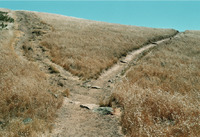Items
Site
The Medicine Chest
keywords is exactly
Pierre Huyghe
-

Or
"The processes of digression and diversion have much in common with what the writer Ross Chambers (1999) calls ‘loiterature’. Chambers investigates the digressive, category-blurring genre of writing found in works such as Nicholson Baker’s 'The mezzanine', Paul Auster’s 'City of glass' and Laurence Sterne’s 'Tristam Shandy'. Loiterly writing, according to Chambers, disarms criticism by providing a moving target, shifting as its own divided attention constantly shifts. Criticism depends on the opportunity to discriminate and hierarchise, determining what is central and what is peripheral (Chambers 1999: 9), which this form eludes by resisting contextualisation or singular categorisation. Loiterature promotes sites of endless intersection, where attention is always divided between one thing and some other thing, always willing and able to be distracted, contrasting ‘the disciplined and the orderly, the hierarchical and the stable, the methodical and the systematic’ (Chambers 1999: 10). In contrast to methods of science that seek to stabilise objects within taxonomic systems or that require the formulation of hypotheses to provide direction for experimentation and a basis for concrete outcomes, the processes of curatorship and artmaking revel in rerouting and redirecting and in diversion and digression" (Liebenberg 2021: 286). -

Timekeeper
Installation view of a hole revealing all painting of successive exhibition layers, 20 cm in diameter at the Viennese Secession -

L’Ellipse
In the triple–screen projection 'L’Ellipse' (1998), Pierre Huyghe slowed a jump cut from Wim Wenders’s 1977 film 'The American Friend' and expanded it by adding his own footage of the film’s leading man, Bruno Ganz, now older, acting out a scene that the film itself skips – a walk across a city, from one apartment to another, between important phone calls.


